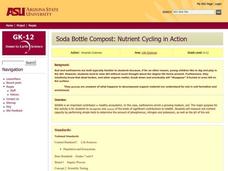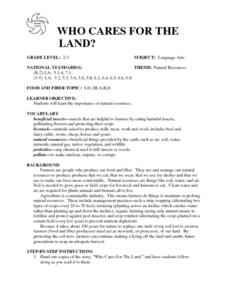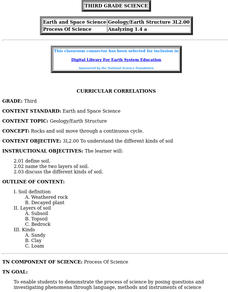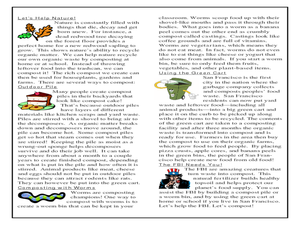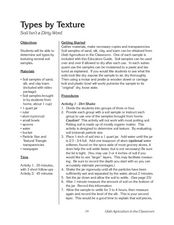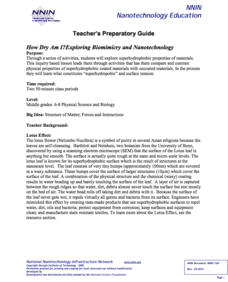Curated OER
Main Idea and Details
In this main idea and details activity, students read the paragraphs and the examples sentences. Students write if the sentences are a main idea or detail to complete the 8 examples.
Curated OER
The Dirt We Depend On; Soil Destruction and Conservation Reading Comprehension Worksheet
In this soil destruction and conservation worksheet, learners read a three page non-fiction article. They answer 10 fill in the blank questions and 1 short answer question based on the reading about soil building methods.
Curated OER
Soda Bottle Compost: Nutrient Cycling in Action
Students investigate, through their own experimentation, the important role wildlife play in nutrient cycling. Earthworms and compost are used in this experiment and different experimental setups be evaluated.
Curated OER
Isn't It Ionic?
Students research the properties and health risks of organic chemical solvents. They create a Safety with Solvents newsletter to share with others in their school and community.
Curated OER
Who Cares for the Land?
A very thorough lesson plan focuses on what plants need to grow and stay healthy. There are excellent reading activities and worksheets included in this fine plan. A terrific way to introduce a unit on plants and their needs.
Curated OER
Separating Soil from Dirt
You can use these lesson ideas to teach students about the importance and ecology of soil.
Curated OER
Introduce Vocabulary: Grandfather's Journey (Say)
Read Allen Say's classic tale Grandfather's Journey as scholars expand their vocabulary in context (note: this strategy could be done with any text). Wondering what words they will learn here? Although you could easily include more,...
Curated OER
The City From the Ooze
Students investigate the life in the mud found around ponds. They create Ooze City using pond mud. Students investigate the various layers that form and what type of organisms are in the mud.
Curated OER
Origin of Coal
Pupils explore how coal is formed. They then discuss the information and answer any questions that they may have on the formation of coal. Students then answer questions in reference to the coal discussion and reading.
Curated OER
The Dirt on Worms!
Fourth graders make predictions, observe, collect and record data. They investigate several soil and worm websites. Finally, 4th graders write a letter to The President which defends earthworms by explaining their value to the United...
Curated OER
How Long Until Dirt
Third graders examine the difference between composting and wasting food. They problem-solve what to do about leftovers after lunches so good food doesn't go to waste.They study food storage techniques that are environmentally friendly...
Curated OER
Curricular Correlations
An interesting lesson on different types of soils is here for you. In it, learners discuss what soil is, and consider three piles of soil - clay, sand, and loam. During the rest of the lesson, third graders discover all sorts of...
Curated OER
What's In the Dirt?
Third graders watch a demonstration and write in their journals their predictions about how time might affect the moisture in the two paper towels. Using a Berlese funnel, they record their observations when it comes the amount of...
Curated OER
"Investigating Soil Color and Texture"
Ninth graders will identify/understand the differences between soil and dirt. They will classify soil color accurately and use Munsell notation to describe it (Munsell books provided).Students will classify soil texture using the feel...
Curated OER
Soil Porosity, Moisture Content, pH, and Density
This lab activity does not have to be done with AP environmental scientists. It can also be done with middle to high school earth scientists. The procedures aren't complex. Learners determine the density of dry and wet sand in order to...
Curated OER
Examine an Ecosystem
Students examine an ecosystem and record what they see. In this ecosystem instructional activity students use a worksheet to help them identify the organisms in their ecosystem.
Curated OER
Micro-organism Immune System Tag
Learners play a game of tag and reinforce their understanding of the immune system.
Curated OER
Particulate Matter: How Dirty is the Air We Breathe?
Fourth graders create a simple testing device and collect and observe the pollution in the air we breathe.
Curated OER
Soil Recipe
Students examine the components of soil. They work together to use different materials to create their own soil. They make their own dirt cake as well.
Curated OER
Modeling a Soil Profile
For this soil profile worksheet, students use a cup to create the layers of soil using clay, sand, gravel and dirt. Students label each component as either A, B, or C horizon and the bedrock. They answer questions about their model.
Curated OER
Let's Build a Worm Bin
Students explore the process of decomposition. In this ecology and measurement lesson, students prepare a worm home to be used for vermicomposting. Students weigh a group of worms and the added food, recording this information on a data...
Curated OER
The Effects of Trash and Garbage On the Environment
Students recognize the importance of solid waste management. In this science lesson plan, students analyze individual solid waste management habits as they enhance their knowledge of solid waste disposal and the recycling process.
Curated OER
Types by Texture: Soil Isn't a Dirty Word
Second graders experiment with different types of soil to find the texture. In this types of soil experiment, shake a jar of soil and water and record the settling of the soil. Students record again after 3-4 hours and note the level...
National Nanotechnology Infrastructure Network
How Dry am I? Exploring Biomimicry and Nanotechnology
Help your classes feel like they can walk on water! An engaging inquiry-based activity has young scholars experiment with different surface coatings. They make observations about their properties and how they relate to the surface...




